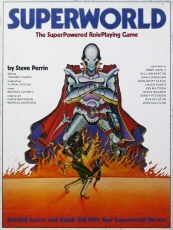Superworld

Superworld cover
|
|
| Designer(s) |
Steve Perrin Steve Henderson |
|---|---|
| Publisher(s) | Chaosium |
| Publication date | 1983 |
| Genre(s) | Superhero fiction |
| System(s) | Basic Role-Playing |
Superworld is a superhero-themed role-playing game published by Chaosium in 1983. Written by Basic Role-Playing and RuneQuest author Steve Perrin, Superworld began as one third of the Worlds of Wonder product, which also included a generic fantasy setting, "Magic World", and a generic science fiction setting, "Future World", all using the same core Basic Role-Playing rules. Only Superworld became a game in its own right.
Superworld is based on the traditional Chaosium Basic Role-Playing system augmented by super-powers.
Seven characteristics (Strength, Constitution, Size, Intelligence, Power, Dexterity, Appearance) are rolled with dice (2D6+6, rather the 3d6 used for many other Basic Role-Playing games.) The sum of these characteristics gives a total of Hero Points used to buy super powers.
The super powers system follows the Champions model of powers that are described by their effects. For example, one does not buy "Laser Vision", but the effect "Energy Blast" and specifies that it is a laser emitted by the hero's eyes. Each effect can be modified by Advantages (less energy expenditure, for example) or Disadvantages (reduced number of uses, for example) which increase or reduce the cost of a power.
Hero Points can also be used to buy skills or increase characteristics. It is possible to get more Hero Points for character creation by choosing Disabilities for the character, such as Public Identity, Vulnerability to a Substance, Psychological Problems, etc. More Hero Points would be awarded for experience at the end of a game session.
The system functions in the same way as the other Basic Role-Playing games, by rolling percentile dice against skills. Lower rolls than needed can cause increased effect from Specials (equivalent to Impales in RuneQuest), or Criticals, and high rolls can cause critical failures (Fumbles). Combat rules have many options and take into account three types of energy for damage: Kinetic, Electric, and Radiation.
...
Wikipedia
